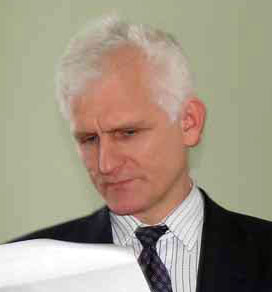Ales Bialiatski: ‘Currently, the Belarusian society is constrained by repressive legislation’
Shortly after the Nasha Viasna constituent congress on 29 March, the NGO’s Chair Ales Bialiatski commented on the underlying reasons for another attempt to obtain state registration.
‘In fact, there has been a continuous process: on the one hand, we have not appealed the refusal by the Ministry of Justice yet. On the other hand, we have held another constituent congress on 29 March to draw up one more application to the Ministry of Justice. The decision is closely connected to the extremely low amount of impartial considerations of similar refusals by the Supreme Court. One can count them on the fingers of one hand – the organizations that managed to protect their rights at the Supreme Court. Needless to say of the political loyalty of the Supreme Court – the statistics are expressive: the cases are often considered in a very harsh manner and a dot or a comma can sometimes result in a refusal. This is what we had to face back in 2007, when the human rights organization was deprived of its official status due to trivial reasons.
This is going to be our third and final attempt. This is what we have agreed upon. We will try to draw up a bureaucratically perfect application, so that not a single comma could be criticized. However, we will do our best to attract the international human rights community, so that they could influence the situation, taking into account Belarus’ attempts to improve its international reputation. I think that the issue of Nasha Viasna’s registration will be a serious test for the Belarusian authorities, concerning the obligations to be undertaken when joining the Eastern Partnership. Having met with various EU officials, I can state that they have repeatedly stressed that Belarus’ membership in the Eastern Partnership could not be unconditional without certain obligations. Belarus’ activities in the Eastern Partnership will be to a great extend connected to the country’s willingness to implement the international human rights standards.
We are offering our hand to the Belarusian authorities; the registration is necessary to the authorities as well. We are going to act openly, legally and transparently. We are not going to hide our objectives. They are obvious and we want the state to implement its human rights obligations and the provisions of the Belarusian Constitution.
In my opinion, today, when modern technologies make it possible to immediately distribute data, it is not a big problem for human rights NGOs to keep in touch with their colleagues, target groups or society in general. Every human rights activist can work independently, which is what we have been doing lately. At the same time we can pursue collective aims. In any case, we will continue our regular human rights activities, first of all, rendering assistance to the victims of human rights violations, collecting and distributing human rights information, preparing themed reports for international conferences and organizations, communicating with mass media, human rights education programs and monitoring elections, which we have been doing over the past 10 years.
There is a series of repressive laws, which concern the political and social life of Belarus, including the rights and duties of its citizens. Suffice it to mention the bills passed over the years: the Law on Mass Media, the Law on Counteracting Extremism, the Law on Mass Actions, the Law on NGOs and the amendments providing for criminal prosecution for membership in an unregistered organization. All of them require a serious and through reform. Currently, the Belarusian society is constrained by the repressive legislation. We must strife for the review of these laws, alongside with the democratization of the society in general, which will enable Belarusian citizens, NGOs, trade unions and political parties to feel free.’


















